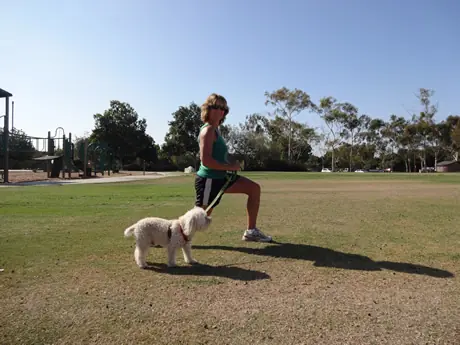
Ronna Edwards of Provo, Utah, found out she was pregnant mere weeks before the St. George Marathon after training for the event over the past six months. After a consultation with her doctor, where they both agreed that a marathon during her first trimester was not a good idea, Ronna had to cope with a nagging sense of disappointment after going from "feeling very active to feeling exhausted and nauseated all the time."
Now into her second trimester--when the chances of miscarrying are much slimmer and her bouts with morning sickness are a thing of the past--Ronna is ready to resume a fitness routine that will keep her and her unborn baby healthy.
The question is, what can she do that will allow her to stay fit, avoid unnecessary weight gain and bounce back physically after giving childbirth?
More: Pilates for Pregnancy
Initially I was reluctant to address this issue, possessing neither a degree in pre-natal care nor experience in personal training for pregnant women. I changed my mind after doing some research, consulting with my pediatrician mother (who specializes in newborn babies and works closely with obstetricians), and speaking with a few expectant mothers that are also very athletic.
First and foremost you should consult your health care practitioner if you are pregnant and eager to stay fit.
As each pregnancy is unique and influenced by numerous factors ranging from hereditary conditions to eating habits to prior fitness experience and current state of health it is imperative that expectant mothers first consult their personal physician about what sort of exercises are safe for them.
I found a wealth of useful information in What to Expect When You're Expecting, by Heidi Murkoff, Arlene Eisenberg and Sandee Hathaway. This reference manual contains an entire chapter on physical fitness for expectant mothers. With over 10 million copies in print and a consistent best-seller on Amazon.com, it was a valuable resource in gathering some of the relevant information below.
More: Why Workout Should Change During Pregnancy
Many women become less fit as their pregnancy wears on, understandably so because their weight increases rapidly. But with a carefully designed personal fitness program, most women can avoid this slump and enjoy the benefits that moderate physical activity provides.
These benefits include increased energy, improved sleep patterns, stronger muscles, better endurance (which can help ease labor), and a reduction of common pregnancy symptoms such as bloating, swelling of extremities and back pain.
Below is a partial list of sports and activities that are considered safe to do if you're pregnant--but again, only after a consultation with your physician:
- Yoga
- Swimming
- Light weight training
- Low-impact aerobic activity (stationary bike, walking, Stairmaster, aqua aerobics)
- Any designed-for-pregnancy routines that can include Pilates, calisthenics, and Kegel exercises
Indeed, given my own swimming background, I know several women who have swum up to 4,000 meters a day right until they were ready to deliver! They assured me that swimming not only kept them flexible, fit and happy during their term, but that the water's buoyancy allowed them to relieve some of the back pain they were feeling while on land--especially during the third trimester.
More: Cycling During Pregnancy?
Leilani Eickhoff, an avid triathlete and masters swimmer in Los Angeles, continued swimming, with her doctor's blessing, three times a week throughout her pregnancy. In addition, she takes a weekly pre-natal yoga class.
"I am really happy I've continued swimming regularly throughout my pregnancy," Lani says.
"At first, it was really difficult just to get out bed to make the 5:45 a.m. workouts. Additionally, my competitive side really struggled with slowing down and having to move to slower lanes. But, now that my pregnancy is almost over, I can really see the benefits. I continue to have good energy, have not experienced any swelling or leg cramps, and I feel like the activity has helped with my overall weight gain."
She is also thankful for the benefits that the yoga class provides.
"It really helps alleviate lower-back pain, and the relaxation and breathing techniques I learned should come in handy during childbirth."
If you are a novice to the pool, and expecting a child, it's probably not wise to start swimming at this point. But there are shallow-water exercises, such as aqua-aerobics classes, that are available at many health centers that can get your heart rate up and provide gentle aerobic conditioning.
In Ronna's case, as a passionate runner, she should look into the possibility of aqua-jogging. It is easy on the joints, low-impact and effective in working the all-important quads. It is much safer than running on land for extended periods of time. Even experienced runners should avoid jogging over two miles when they are pregnant and many doctors will recommend not running at all.
- 1
- of
- 2
About the Author










Discuss This Article